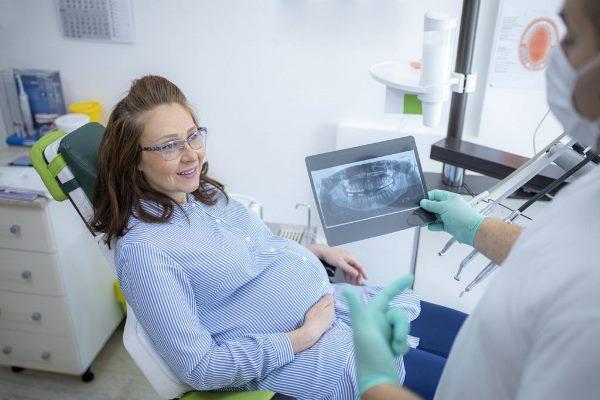Patients can have all the necessary dental x-rays at any stage of pregnancy if the appropriate safety equipment is used correctly.

The amount of ionizing radiation produced during dental X-ray procedures is so small that the risk of fetal anomalies is minimal. Even with this information, many dentists hesitate to perform x-rays on pregnant patients.
“Exposure to dental ionizing radiation poses a low risk of fetal or fetal malformation or miscarriage,” write the authors, led by Caroline Flagler, a master's degree student in pharmacology and toxicology at Virginia Commonwealth University Richmond.
Annually, pregnant people make up about 4 million of the US population. But less than 50% of pregnant women seek dental care for fear of dental instruments and concerns for the safety of their unborn children.
Although evidence shows that proper oral care is essential for patients and their unborn children, most OB/GYNs do not refer pregnant women to dentists. In addition, dentists still have misconceptions about the importance of oral care during pregnancy.
Because the safety of performing dental x-rays on pregnant patients has been controversial since the 1960s, the authors decided to review the literature to determine the impact that dental ionizing radiation might have on a segment of the population such as pregnant women. The review looked at studies from 1957 to 2021.
For 60 years, dosimetric indicators show a significant reduction in doses of ionizing radiation and exposure. For example, innovations in digital imaging have reduced exposure by 60% by switching from the slowest D-speed to the fastest F-speed of X-ray film.
In 1959, a radiation dose of as little as 0.1 Gy to an embryo or fetus was an indication for therapeutic abortion, while in 2016 it was concluded that the absolute fetal dose from dental ionizing radiation was negligible, as estimates of fetal dose ranged from 0.005 to 2.1 mcg. Because dental ionizing radiation has deterministic effects, it is unlikely to cause fetal birth defects.
Fear of legal action, liability disputes, and the lack of training, clinical guidance, and curriculum offered by dental schools make some dentists reluctant to perform x-rays on pregnant patients. To solve this problem, dentists should contact the patient's OB/GYN and jointly develop a treatment plan. But ultimately, dentists must take responsibility for the patient's prenatal oral care, which may include x-rays of the teeth if necessary.
The shortcomings of the review are that it was based largely on secondary data. Some primary data sources used phantoms, cadavers, or simulated projections due to the ethical implications of exposure to ionizing radiation on pregnant women.
“As long as proper precautions were taken and safety standards were followed, dental x-rays were considered and remain safe for pregnant patients,” concluded Flagler and her colleagues.
